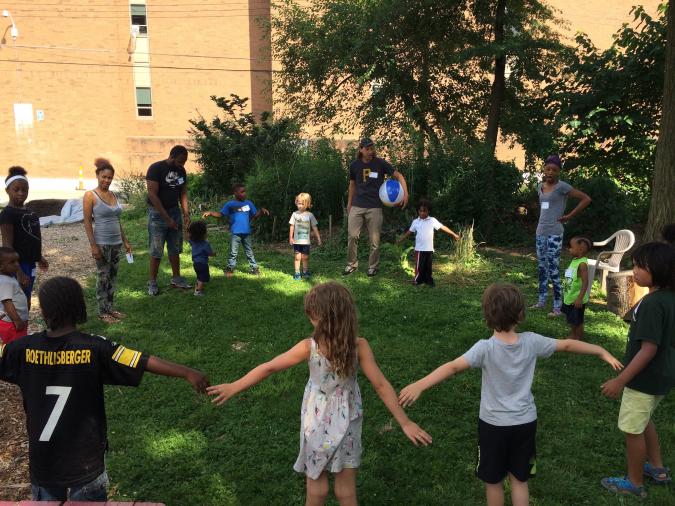Art in the Garden is OMA Pittsburgh’s first program for youth.
Art in the Garden started in 2012 when Scilla Wahrhaftig, the former head of the Pittsburgh branch of the American Friends Service Committee, saw a void in East Liberty in activities available to youth after school and in the summer. Following her lead, Art in the Garden continues to engage youth in urban gardens in active, structured, and supportive ways. Every year since Art in the Garden’s inception, youth and their families have expressed a desire and need for expanded programing.
In 2017, Art in the Garden expanded from a few hours 1x a week to four hours a day 3x a week.
In 2018, with support from The Heinz Endowments, the Neighbors Committee, and individuals like you, we were able to expand enrollment and to hire more staff, including two Junior Counselors who had attended Art in the Garden in the early days! We’re so proud they are choosing to be leaders. We also were able to offer two Surviving to Thriving training seminars to the public. These seminars focus on social, emotional, mental and behavioral health issues of youth and skills adults can use to support youth.
In 2019, Art in the Garden is expanding programming to the African Healing Garden in Larimer. Youth will be able to attend camp at a single site—the African Healing Garden on Mondays or Borland Garden on Tuesdays, Wednesdays, and Thursdays—or at both sites. We are also developing and implementing a curriculum to be used by Art in the Garden teachers (and ultimately to share freely with other interested programs!) which focuses on fostering resilience and social and emotional development through hands-on projects in the arts and ecology.
Art in the Garden helps to create a just society.
In line with the recommendations from The Aspen Institute’s 2019 report, From a Nation at Risk to a Nation at Hope, Art in the Garden aims to affirm the cultural backgrounds of the youth we serve, focus on whole-child development, engage restorative approaches to conflict, nurture relationships, engage youth in arts and ecological activities that support values of responsibility and resilience, and help youth develop tools to process and heal from trauma. The report states: “[A]ll children can experience stress and trauma, regardless of family income or background. But low-income students and students of color in our society, as well as their families, are more likely to be exposed to chronic unbuffered stress—such as violence, food shortages, homelessness, or the loss of a parent…. Ensuring access to high-quality, equitable learning environments that respond to each child’s needs, assets, culture, and stage of development can help mitigate some of these stresses and provide a pathway to a more equitable future.”
Supporting the social and emotional development of youth—such as helping youth develop tools to process and heal from trauma—contributes to the creation of a healthy, inclusive, and equitable society. Above all, Art in the Garden seeks to enable youth to grow in their understanding of connectedness to themselves, each other, and our earth. Our programming supports youth knowing—in deep and lasting ways—the interconnectedness of all living beings, and the ways in which we are all whole and all belong.
Art in the Garden is a program that:
- Empowers children with solutions-based approaches to care for our environment in this time of climate change
- Supports children in seeing themselves as creators through the visual arts, poetry, music, dance, and theater so that they may live their fullest expression of themselves
- Gives children tools to grow in their ability to empathize, communicate, develop confidence, be team-players, and make constructive choices
- Utilizes research from neuroscience on how to help children develop resilience
- Plans a curriculum that will be free for all programs interested in teaching social and emotional learning and resilience through the arts, ecology, and food justice
- Supports adults through OMA’s Surviving to Thriving seminars and collaborative conversations—in developing our understanding of trauma, its effects on youth, how to help youth develop resilience and stronger brain architecture, and building system change in schools and summer programs in Pittsburgh and beyond.
Curriculum
The Art in the Garden curriculum focuses on secular mindfulness and emotional well-being through the arts and ecology. One strand of our curriculum, headed by Sten Carlson, combines concepts from social emotional learning and trauma informed care with innovative growing practices from permaculture and agroforestry. It engages youth in a solutions-based approach to global warming. On the ground, this curriculum observes trees and other perennial plant “guilds” that mutually support one another, improving ecosystem health and increasing biodiversity while producing food and other products useful to humans. These systems of mutual support and abundance become analogs for the social-emotional realities of youth’s lives. Youth develop empathy and sensitivity through working with plants; they learn how plants grow more resilient and adaptive in guilds through cooperation, sharing of resources, and increased diversity.
Another strand of our curriculum, headed by Emily Carlson, combines art activities with what we know about neuroplasticity and how social and emotional learning changes the brain. As youth engage various weekly themes—such as recognizing emotions, basic goodness, perspective-taking, gratitude, resilience, and compassion—through the arts, they find that that instead of reacting impulsively they’re more often able to step back and choose how they want to respond, even in difficult situations. The premise is this: when we develop our ability to care for ourselves, our compassion for ourselves and others grows. As youth create masks, poems, music, sculptures, and mosaics they learn the value of their voices, experience the joy of creation, and celebrate one another.
Monthly Activities for Youth
One positive effect of OMA’s Art in the Garden summer program has been to inspire Borland Garden members to invite young gardeners to participate in fun activities during our monthly community outdoor garden work party. Borland Garden learned best practices for community building like: offering family and child-friendly gardening activity and gardening space, offering foods to prepare and taste, teaching a game or offering an arts activity. Cathy Fitzgerald is creating a guide with a calendar of favorite gardening, cooking and arts activities to share with other interested urban gardens that have young gardeners in their community.

